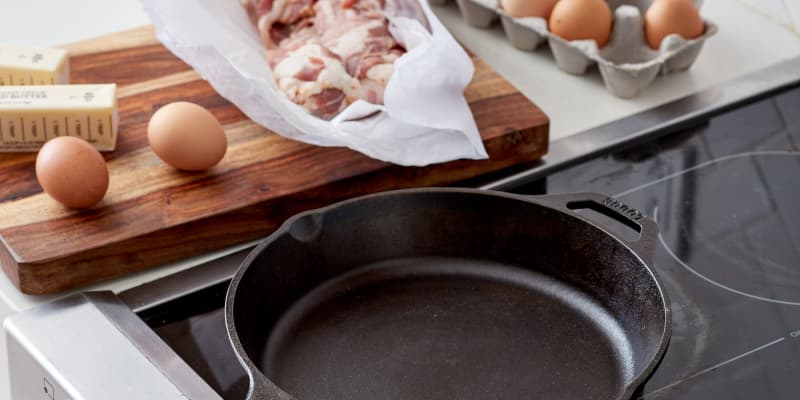Cast Iron vs Induction Pans: Which is the Best Pick for BBQ Fans?
Written By James Morgan
For the committed BBQ fans, selecting the right cookware is essential as it can greatly influence the flavor and quality of your grilled meals. Two commonly debated options are cast iron and induction pans. Each type of cookware offers distinct advantages, and understanding these differences can guide you toward the best choice for your grilling adventures.
The ongoing discussion regarding cast iron vs induction pans tends to ignite passionate viewpoints within the culinary community. Both options have their unique benefits, making the choice highly personal and dependent on individual cooking styles and preferences. Lets explore the qualities of each to help determine which best fits your barbecue needs.

Why Opt for Cast Iron?
Cast iron pans have earned their spot as essential kitchen ware, celebrated for their durability and exceptional heat retention. These pans are ideal for BBQ fans who appreciate cooking over open flames or grills. Cast iron's ability to hold consistent heat makes it perfect for slow-roasted meats, giving them that sought-after sear and smoky taste.
Another notable perk of using cast iron is its versatility. Whether you're grilling on a barbecue, baking in the oven, or sauting on a stovetop, cast iron can manage it all with ease. Its sturdy construction allows it to endure high temperatures, making it a go-to choice for grilling enthusiasts. Discover more about cast iron on induction cooktops.
Why Choose Induction Pans?
Conversely, induction pans stand out for their energy efficiency and precise temperature control. These pans are specifically designed for use with induction cooktops, which employ electromagnetic fields to heat the cookware directly. This approach is not only faster but offers greater control, allowing for precise adjustments in temperature.
For BBQ fans favoring indoor cooking or controlled environments, induction pans present a cleaner cooking option. They tend to be lighter than cast iron, making them easier to handle and store. Furthermore, induction pans are known for their even heating, which is advantageous for dishes requiring meticulous temperature regulation. Learn about induction cooktops.
Cooking Performance Comparison
In assessing the cooking performance of cast iron vs induction pans, its important to reflect on what you hold dear in your grilling endeavors. If rich, smoky flavors and outdoor cooking appeal to you, then cast iron might be your ideal option. On the flip side, if accuracy and efficiency are prioritiesespecially for indoor grillinginduction pans warrant consideration.
Cast iron excels when high heat retention and distribution are necessary; its perfect for searing steaks and other meats, sealing in flavors and juices. Meanwhile, induction pans offer a modern cooking method where rapid heating and temperature accuracy are crucial.
Maintenance and Care
Maintenance and care are crucial when differentiating cast iron vs induction pans. Cast iron pans need regular seasoning to uphold their non-stick surface and avoid rust. While this may be viewed as a drawback, many BBQ fans find the seasoning process rewarding and almost meditative.
In contrast, induction pans are typically crafted from stainless steel or other non-reactive materials, which require little upkeep. They are usually dishwasher safe and dont necessitate seasoning, making them a more convenient option for those who prefer low-maintenance cookware. However, it's essential to ensure your induction pans are compatible with your specific cooktop.
Environmental Considerations
From an environmental standpoint, induction cooking is more energy-efficient than traditional cooking methods. Induction cooktops heat pans directly, minimizing energy wastage, which contributes to a smaller carbon footprintan important factor for eco-minded cooks.
Cast iron, known for its longevity, is often handed down through generations, reducing the need for replacements and making it a sustainable choiceprovided you are willing to invest the necessary maintenance effort. Find out more about the environmental benefits of using cast iron.
Conclusion: Choosing What Suits You Best
Ultimately, the choice between cast iron and induction pans hinges on your personal preferences and cooking methods. Both cookware types have unique strengths that can enrich your barbecue experiences. If you value tradition and outdoor cooking, cast iron may take the lead. Conversely, if modern efficiency and convenience appeal to you, induction pans are a worthy consideration.
By comprehending the differences between these two cookware varieties, you can make an informed choice that resonates with your culinary habits. Regardless of your selection, both cast iron and induction pans will help you create mouth-watering meals for your family and friends. Explore more on how to use cast iron with induction cooktops.

FAQ
Can cast iron pans be used on induction cooktops?
Yes, cast iron pans are compatible with induction cooktops due to their magnetic properties. Ensure the base is flat for optimal contact with the cooktop surface.
Which is more energy efficient, cast iron or induction pans?
Induction pans are generally more energy-efficient as they warm up quickly and minimize energy loss. While cast iron pans are durable, they require more energy to heat initially but shine in heat retention.
How do I maintain a cast iron pan?
To care for a cast iron pan, you should season it regularly with oil to uphold its non-stick surface and prevent rust. After washing, dry it thoroughly and apply a thin layer of oil before storing it.



